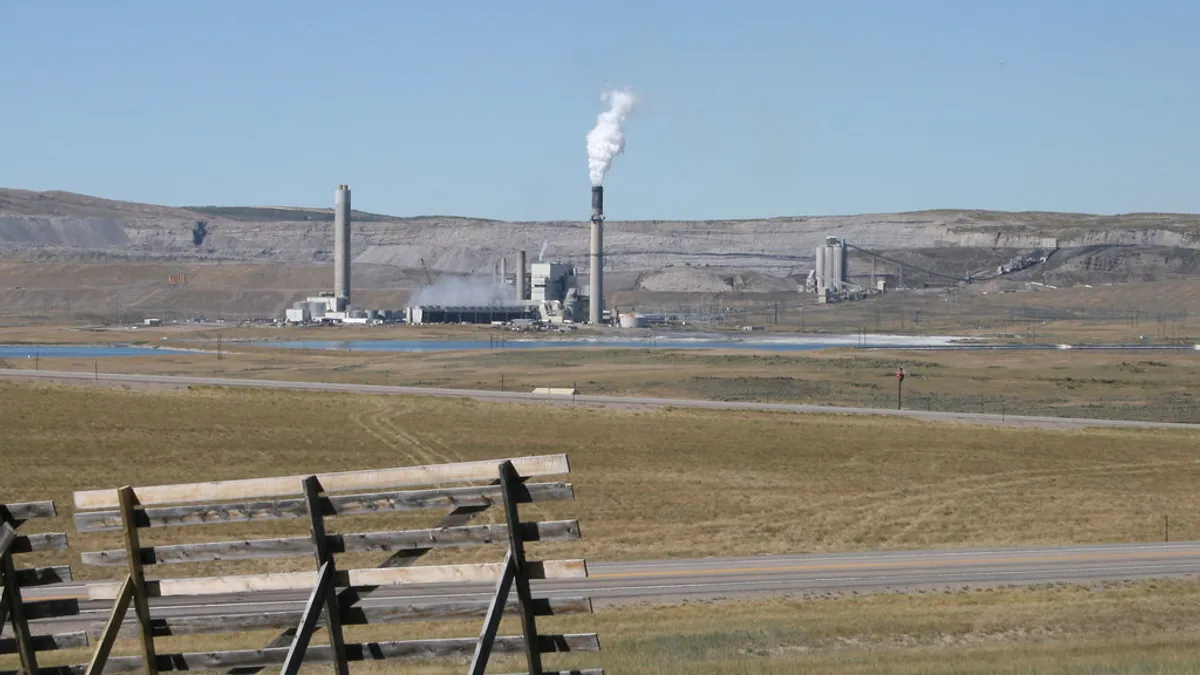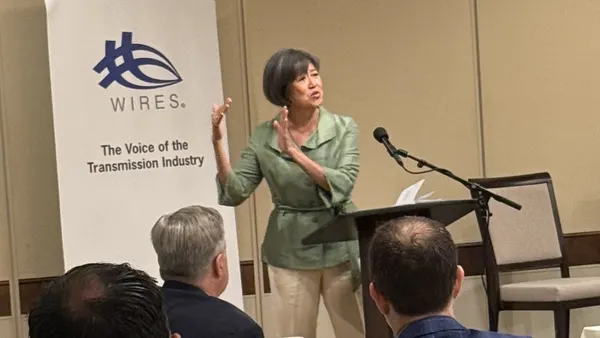Dive Brief:
-
Stakeholders began arguments Monday in a "highly unusual — if not unheard of" proceeding before Wyoming regulators over the future of four coal units in the state.
-
Regulators initiated an investigation into Pacificorp-subsidiary Rocky Mountain Power's plans to retire units 1 and 2 of the Jim Bridger Power Plant and units 1 and 2 of the Naughton Plant in November.
-
Some of the most staunch opponents of the plant retirements are commissioners of the counties where the coal plants are located, while Pacificorp and environmental groups are defending the utility's decision to retire the plants and add several gigawatts of renewable resources and energy storage.
Dive Insight:
Pacificorp in October announced plans to add nearly 7,000 MW of renewable energy and storage capacity by 2025, as well as shut down 20 of its 24 coal units by 2038. The utility operates in six states — Oregon, California, Washington, Idaho, Utah and Wyoming — and on Oct. 18 filed with individual state regulators for approval of its 20-year integrated resource plan (IRP).
Wyoming regulators on Nov. 13 issued an order initiating an investigation of subsidiary Rocky Mountain Power's IRP, a step that is "very different" from previous proceedings, Shannon Anderson, staff attorney at Powder River Basin Resource Council, who testified in support of RMP's plan, told Utility Dive in an email.
Normal proceedings would constitute written comments in response to the proposed plan and "at most" an hour-long open meeting, she said. Instead, Wyoming regulators launched a week-long administrative trial, the first in Wyoming's history held for an IRP, a move that's highly unprecedented nationwide as well, according to Anderson.
"To my knowledge it is highly unusual – if not unheard of – for a state to open a contested case proceeding investigation into an IRP like [Wyoming] has done here," she said.
Regulators in their November order cited potential economic and reliability impacts that could come from retiring the Naughton and Bridger units before the end of their depreciation life.
"These impacts, individually and collectively, must be thoroughly evaluated to ensure [implementation] of the Preferred Portfolio is consistent with the public interest," the Wyoming Public Service Commission (PSC) wrote.
Resource extraction is the largest industry in Wyoming and the state has been the number one producer of coal since 1986, according to the U.S. Energy Information Administration (EIA). The state's electricity mix was almost 90% coal in 2018, EIA found, with renewable energy making up most of the rest.
Wyoming's economic reliance on coal has put potential avenues of preserving the fuel, specifically through carbon capture, utilization and sequestration (CCUS), at the center of PSC Chair Kara Fornstrom's agenda, Utility Dive reported in December. Mounting coal plant retirements, as the economics of wind, solar and natural gas grow more favorable, have increased political pressure to save the resource, according to Anderson.
"This is about [Wyoming] political forces pushing back on [Pacificorp] and holding on to coal," she said.
Opponents of the plant retirements, including county commissioners, argued the hearing was about preventing out-of-state corporations from making decisions about Wyoming livelihoods. Intervenors in the case include state and national environmental groups, consumer groups, oil companies and local counties.
"This is being called a unique hearing. I call it a right-on-target hearing," Kent Connelly, chair of the Lincoln County Commission, where the Naughton power plant is located, said during the hearing.
Further, he criticized the utility for taking an approach based on other state laws — particularly states with more aggressive renewable portfolio standards, such as California, Washington and Oregon.
"We're not paying for what Rocky Mountain Power wants to provide to Oregon," he told Utility Dive. "A green portfolio sounds nice, but who's paying for it?" He and other opponents are arguing for RMP to consider CCUS as an alternative to retiring the plants.
Oil companies Glenrock Energy and Big Muddy Operating are among the intervenors calling for CCUS, in part because it would also boost enhanced oil recovery in the state.
"Wyoming presents ideal conditions for CCUS due to locations of coal-fired plants, low cost of generation and nearby mature conventional oil fields. CCUS will increase oil production from conventional reservoirs by providing CO2 for enhanced oil recovery," Dale Cottam, a partner at Bailey Stock Harmon Cottam Lopez, LLP, testified on behalf of Glenrock.
But RMP defended its IRP in oral testimony during Monday's virtual hearing, saying its plan is consistent with the falling costs of wind, solar and natural gas, despite the potential economic impacts of retiring coal plants on the community at large. Further, it argued, job loss from plant closures falls outside the PSC's purview.
"The mission is safe, reliable electricity at reasonable rates. There are other agencies and governmental functions that concern themselves with economic development, or environmental regulation," Jacob McDermott, senior attorney for Pacificorp, said during the virtual hearing.
"If [the commission] elects to step away from this duty, the commission risks playing the game of picking winners and losers among Rocky Mountain Power's customers. Should Customer A pay substantially higher rates so that Customer B can keep his job? The commission would have to abandon fundamental regulatory principles to make such a determination."
Commissioners were not able to comment on the ongoing proceeding, but during the hearing Deputy Chair Mary Throne questioned one witness on whether the external costs of utility-scale renewable energy buildouts could be quantified, citing resident concern over impacts to wildlife, tourism and other factors.
"If we're going to consider the ... health-related impacts of coal facilities, would it also be reasonable to consider the external land, visibility and potential economic decline of tourism, related to utility-scale renewables?" she asked witness Lance Kaufman, a consultant and expert witness for consultant group Aegis, who was called as a witness by Anderson for Power River Basin Resources.
"If you're going to consider external impacts, it's appropriate to consider the impact of all the scenarios that are under consideration," said Kaufman. "However, I suspect that the external impacts of renewable generation ... would be lower than coal generation."
The hearing is scheduled to continue throughout the week.
Correction: A previous version of this story misspelled Deputy Chair Mary Throne's name.














